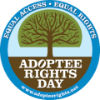There are some things that frustrate me more than I know how to fully explain.
Adoption hurts. I know that I don't speak for all adoptees. But I certainly know enough adoptees to know that I'm not alone in saying this. Adoption hurts.
I don't know what to do about that fact. For me, as in so many other areas of my life, I begin with education. People need to know that adoption hurts. Not because I expect them to fix me. Not because I expect them to somehow, magically, to make the hurt stop. Not even because I want sympathy (or even better, empathy). I start with education because if people don't know this basic fact, then nothing will change. People will keep acting as though adoption was a win-win-win situation and will praise it as a wonderful thing. Education, at least, gives us a chance to see changes happen for future generations. So I start with education. Ignorance and naivete are the enemy. (Well, the NCFA is the enemy, but ignorance is a close second.)
What is frustrating is the response. "Well, everyone has problems." "The past is the past." And so on.
My first reaction is that it's a compassion problem. How can people hear about the pain of adoptees and react with such coldness? Do they not feel compassion? And I get upset and defensive and may even lash out. Not exactly healthy responses. But those are my first reactions.
The more I think about it, though, the more I believe that it's not really a lack of compassion. Rather, the person has so little awareness about the issues adoptees face that there is nothing there to trigger their compassion. (I've seen this even from other adoptees, who see their lives as good, and don't understand why other adoptees have any issues about it.)
The pain of adoption is invisible. And any education has to undo decades of positive PR for adoption. So even when adoptee has some recognized issue (depression, for instance), many people refuse to acknowledge adoption's role in it. Rather, adoptees who want to raise awareness of the pain that adoption can caused are told to "get over it" or that "they had a bad experience."
At some point, ignorance becomes willful. I don't know how to assail willful ignorance. It doesn't mean I stop trying. But it makes it harder, more frustrating. It makes it easier to imagine giving up.
It is no surprise to me that finding other adoptees (online and in real life) who report similar feelings about adoption has been one of the most meaningful discovery of my life. Being given at least some empathy, having at least some validation of the judgment, those are invaluable.
Because despite the nay-sayers, adoption hurts.
Subscribe to:
Post Comments (Atom)


4 comments:
wondering if you have read "Beneath the Mask" by Debbie Riley - with The Center for Adoption Support and Education outside Washington, DC... they also have a program called S.A.F.E. at School - to educate teachers, parents, school counselors, etc. about the very things you describe. see www.adoptionsupport.org.
Hey Phil, well, I know that I TRIED to read that book referenced above. I actually read bits and pieces of it and it al sounded the same: adoptee goes in for consultation, adoptee resolves issues - generally in favor of the afamily. As a firstmom, it was not helpful nor did I feel that it was truly from the perspective of adoptees who were in charge of their lives; more like they were in therapy with controlling aparents and/or counselors. Just my take.
I'm not sure about the amount of healing that can really occur after adoption. I'm sorry to say, but I am at the point, or of the mind in general that thinks that adoption is a permanent hurt. I just don't see any good in infant adoption.
I hurt from adoption.
Always have.
And sadly - I don't think the pain will ever completely go away.
It would have been better if I had been able to grow in the family I was born to - or - born to the family I was adopted to.
Not this confusing, painful no-mans-land in between.
Great post.
Poss. xxxxxxxxx
Post a Comment